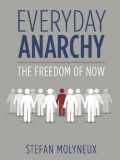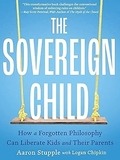Book

The Theory of Moral Sentiments
Man’s moral nature is influenced by sentiment and sympathy. The human ability to sympathize forms the psychological basis of man’s desire to adhere to natural moral laws. Adam Smith explores ideas about individual freedom and self-interest, conscience and virtue, and a classic work of moral philosophy that remains relevant.
aboutLiberty Portal
Liberty Portal is your gateway for free markets and free thinking. We aggregate open-sourced content to promote and popularize important people and lessons within the liberty movement.
suggested
Stefan Molyneux
Everyday Anarchy: The Freedom of Now

The word “anarchy” evokes images of dangerous mobs, spiky-haired youths hurling garbage cans through Starbucks windows, and the chaos of the war of all against all.
However, the word “anarchy” simply means “without rulers” - and this state of affairs is something we desperately desire and defend in so many areas of our own lives. If a political ruler were to tell us who to marry, what to learn, and which job to take, we would rebel against such tyrannical intrusions on our freedoms. If the government were to tell us what to read, want to watch and what to listen to, we would justifiably cry “censorship” and lead the charge against such mind control.
How can we reconcile this contradiction? Is being “without rulers” good, or bad? How can we fear something so terribly, while at the same time treasuring it so mightily?
“Everyday Anarchy” addresses this challenge head-on, arguing that being free of rulers is not something to fear - personally or politically - but rather a goal that we must constantly strive
Read moreHowever, the word “anarchy” simply means “without rulers” - and this state of affairs is something we desperately desire and defend in so many areas of our own lives. If a political ruler were to tell us who to marry, what to learn, and which job to take, we would rebel against such tyrannical intrusions on our freedoms. If the government were to tell us what to read, want to watch and what to listen to, we would justifiably cry “censorship” and lead the charge against such mind control.
How can we reconcile this contradiction? Is being “without rulers” good, or bad? How can we fear something so terribly, while at the same time treasuring it so mightily?
“Everyday Anarchy” addresses this challenge head-on, arguing that being free of rulers is not something to fear - personally or politically - but rather a goal that we must constantly strive
Aaron Stupple
The Sovereign Child

Could it really be okay to let kids eat whatever they want? Sleep whenever they want? Watch whatever they want? If kids are completely free to make their own choices, they’ll develop damaging habits that will haunt them into adulthood. Surely parents have a duty to set a few limits.
But what if this conventional wisdom is wrong? What if our deepest ideas of how learning works, how knowledge grows, and the nature of personhood all point to the brute fact that parenting philosophies have missed a critical detail?
In The Sovereign Child, Aaron Stupple explains Taking Children Seriously, the only parenting philosophy that accounts for the fact that children are people—their reasons, desires, emotions, and creativity all work precisely the same way that those of adults do. Because of this, much of the conventional wisdom simply cannot work as intended.
Using examples gleaned from his years as a father of five, Aaron takes a close look at the unavoidable harms of rule enforcement and the startling alternatives available when parents never give up on treating children as if their reasons for their choices matter as much as anyone else's.
Christina Hoff Sommers
Who Stole Feminism?

Philosophy professor Christina Sommers has exposed a disturbing development: how a group of zealots, claiming to speak for all women, are promoting a dangerous new agenda that threatens our most cherished ideals and sets women against men in all spheres of life. In case after case, Sommers shows how these extremists have propped up their arguments with highly questionable but well-funded research, presenting inflammatory and often inaccurate information and stifling any semblance of free and open scrutiny. Trumpeted as orthodoxy, the resulting "findings" on everything from rape to domestic abuse to economic bias to the supposed crisis in girls' self-esteem perpetuate a view of women as victims of the "patriarchy". Moreover, these arguments and the supposed facts on which they are based have had enormous influence beyond the academy, where they have shaken the foundations of our educational, scientific, and legal institutions and have fostered resentment and alienation in our private lives. Despite its current dominance, Sommers maintains, such a breed of feminism is at odds with the real aspirations and values of most American women and undermines the cause of true equality. Who Stole Feminism? is a call to arms that will enrage or inspire, but cannot be ignored.
Read more


